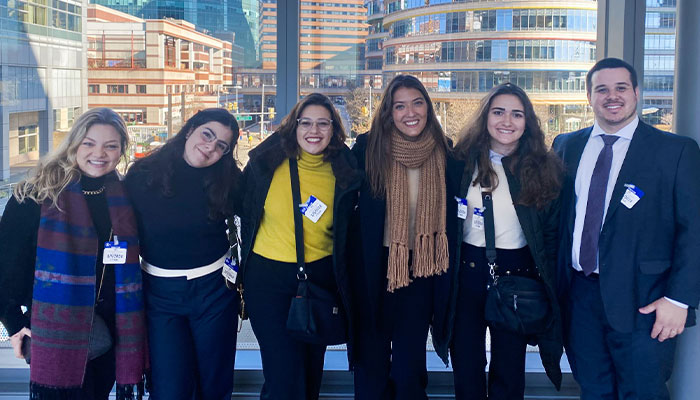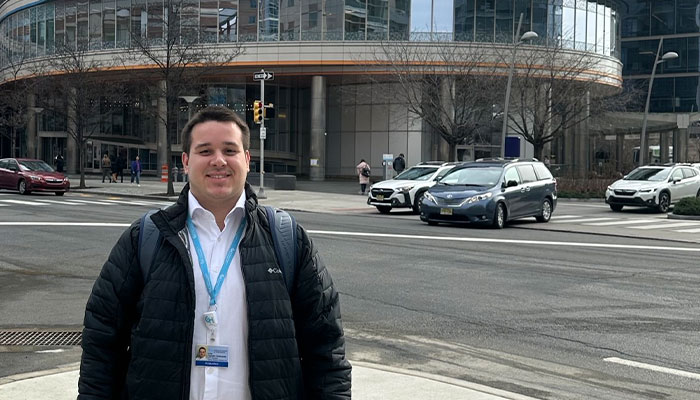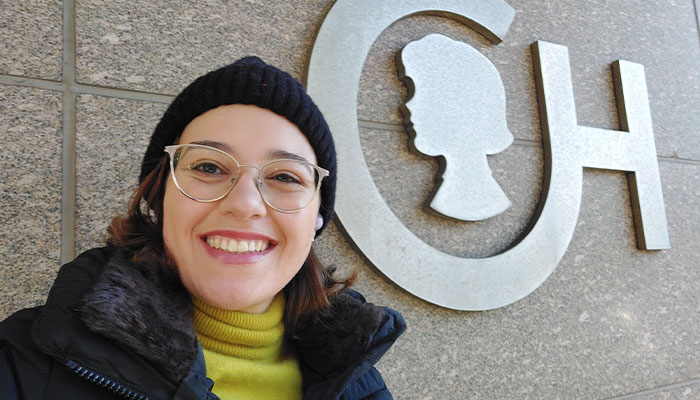HOW CAN WE HELP YOU? Call 1-800-TRY-CHOP
In This Section
CHOP Welcomes São Paulo Med Students Through 'Researchers of the Future’

Six medical students from Santa Casa de São Paulo School of Medical Sciences spent two months at CHOP.
South of the equator and some 4,700 miles away from Philadelphia in São Paulo, Brazil, six medical students learned they would spend the first two months of 2024 at Children's Hospital of Philadelphia Research Institute. In an exciting global partnership between Faculdade de Ciências Médicas Santa Casa de São Paulo (FCMSCSP) and CHOP, the students selected from 100 of their peers met, worked, and exchanged ideas with CHOP's diverse and unique scientific community.
The "Researchers of the Future" program, coordinated by CHOP's Office of Academic Training and Outreach Programs (ATOP), gave the São Paulo guests an opportunity to shadow various CHOP departments while offering CHOP faculty and staff the chance to see their own work from a different perspective. ATOP matched each student with a "homeroom" research group at CHOP and arranged for the students to shadow multiple physicians, attend lectures of interest, and volunteer at CHOP-led events across Philly.
Fast forward two months, and the students have come away from their experience with much more than planned. At a closing ceremony held Feb. 9 at the Roberts Center for Pediatric Research, they shared what they learned "beyond the research" from the mentors, postdocs, investigators, and administrators they now call friends. Their presentations included everything from the formation of new clinical interests to professional development skills, to honing patient interactions, and more.
Daniela Corrêa Areias, who was matched with Julia Parish-Morris, PhD, investigator in the Center for Autism Research (CAR), learned not just about CAR's comprehensive autism research, but also the importance of remembering never to "say no to yourself."
Carolina Ribeiro Ferraz, who matched with Laura Vella, MD, PhD, in Pediatrics and Infectious Disease, described a newfound goal of implementing flow cytometry technology – not yet widely available in Brazil – into her research at home.
Raquel Fink Lins e Silva de Macedo, matched with Joseph Zackular, PhD, investigator in Pathology and Laboratory Medicine, gained "a more complete academic experience" but also learned that "collaboration is key" and that science is far from a linear process.
Lara Trentino Pereira, matched with Adeline Vanderver, MD, program director of the Leukodystrophy Center of Excellence, took away not just a deeper knowledge of rare disease clinical research, but also the special connection physician-scientists build with patients and families for whom their studies represent a beacon of hope.
Luis Fernando Ferreira Cavalcante, matched with Michele Toms in the Clinical Research Staffing Core, received an in-depth look at the intricacies of supporting clinical research studies but also shadowed cardiothoracic and neurology surgeries, volunteered on Martin Luther King Day, and got a taste for Philadelphia culture at a 76ers game.
Julia Martini, matched with Mustafa Mir, PhD, investigator in the Center for Computational and Genomic Medicine, learned about Dr. Mir's lab research into the development of embryos through advanced microscopy technologies, as well as soft skills including communication, critical thinking, adaptability, and networking.
We sat down with Luis and Julia for a deeper dive into what it's like being global "researchers of the future" and how the exchange program broadened their perspectives.
Luis Fernando Ferreira Cavalcante

Luis Fernando Ferreira Cavalcante
Tell us a little bit about yourself and what made you want to go into medicine.
I used to work as an airline pilot for 10 years. So, I did something completely out of the ordinary. I got my pilot's license here in the U.S. in 2011. But prior to becoming an airline pilot, I always had a dream of becoming a doctor, after my father. When the [COVID-19] pandemic hit, I thought, well, there's no better time to try it out. I did and was accepted into five medical schools.
I was doing research as well, and I became passionate about it, even more now at CHOP. Sometimes you don't always see the results of a research study; it's not tangible how the findings are used to make patient care better and safer. But at CHOP, it's different. For example, I was able to follow a hyperinsulinism study here and see how the results changed people's lives.
Is there an area of research that you are most interested in?
I love cardiothoracic surgery. This was my research topic back in Brazil. I'm planning on doing research on that when I go back. But one thing that I'm also interested in is patient safety. I had a conversation here with James Won, PhD, about his Human Factors Program work, and he inspired me. He spent several years with the Federal Aviation Administration, so he also had that aviation background. It was a productive conversation in guiding me through and giving me ideas.
Do you have a favorite part of your CHOP experience?
Yes! I was able to shadow one study, which is called the F-DOPA study. Basically, Charles Stanley, MD, identified genes and syndromes associated with congenital hyperinsulinism and described the standard methods for diagnosing and treating infants with hyperinsulinism. Back in the day, children would be born with very low blood sugar and either pass away or develop mental disabilities and fall behind. Their prognosis wasn't great.
So, I was able to follow one of Dr. Stanley's study patients: I went to the F-DOPA PET scan and saw the process of a genetic test. The patient had a curable focal lesion, he was operated on, and was cured. So, I was able to witness 40 years of Dr. Stanley's research changing a life right in front of my eyes.
In your own words, why would you say these types of partnership exchange programs are important?
The most important thing is to expand your horizons. There is so much beyond what we can see. In the Lion King there's a part in the beginning where Simba's father brings him up to a hill and says, "Everything that the light touches is our kingdom." It's this opening of what's ahead, and what's there for you to see. This would be the greatest take-home message for whenever I talk about this [Researchers of the Future] program.
It is helpful in so many other ways, like being able to explore different languages, cultures, healthcare systems, and ways of practicing medicine. The Brazilian system has some similarities to the American healthcare system, but it's different as well. It's great to be able to come and develop your own opinion about something – like I wish I could do this or that better. An exchange is all about exchanging experiences so that when you go back, you have different perspectives on how to solve a problem.
Julia Martini

Julia Martini
Tell us a little bit about yourself, and why you chose to pursue medicine?
I'm from São Paulo, Brazil. Currently, I'm a fourth-year medical student at the Faculdade de Ciências Médicas Santa Casa de São Paulo (FCMSCSP). I decided to pursue a medical career in my last semester before college entrance exams. What led me to pursue this career was the curiosity to know and understand how the body works, and how all this knowledge can help people. I haven't yet 100% defined what specialty I want to pursue in medicine. But for now, Pediatrics attracts me, especially in the areas of cardiovascular surgery and neurosurgery.
What made you want to apply for the Researchers of the Future exchange program?
It was the opportunity to learn about and experience research and cultures outside of Brazil with financial support.
Can you describe your research or research area of interest?
My previous research was to look at the genetic modulation of a protein in mitochondria called NCLX. NCLX is important to many physiological cellular processes, such as mitochondrial matrix redox state maintenance, and in different tissues, including brown adipose tissue, sensory neurons, B lymphocytes, and cardiomyocytes. In addition to physiological states, NCLX is a prominent factor in pathological processes, such as in cardiac ischemia and Alzheimer's disease.
As for my research interest, it is divided into clinical studies on congenital cardiomyopathies and basic research in general, which I think is incredible.
What was your favorite part about your experience at CHOP?
I had a very good experience here at CHOP, so it's difficult to find just one. But I think the main thing was the people I found here, all friendly, interested, and willing to help you, to answer any questions, to offer opportunities, and the list goes on.
Why would you say programs like Researchers of the Future, and partnerships with CHOP, are important to science, and to research, and to healthcare?
Firstly, I would like to highlight that research experiences in general are extremely important for anyone's medical training, as it helps to build critical thinking about how to solve a problem. So, for me, programs like Researchers of the Future and partnerships with institutions like CHOP are the peak of this research experience, as it strengthens and creates several of the qualities of a future researcher and doctor, such as independence and adaptability. Furthermore, I do not see how now or in the future one can separate science, research, and healthcare.
Learn more about outreach programs through ATOP.